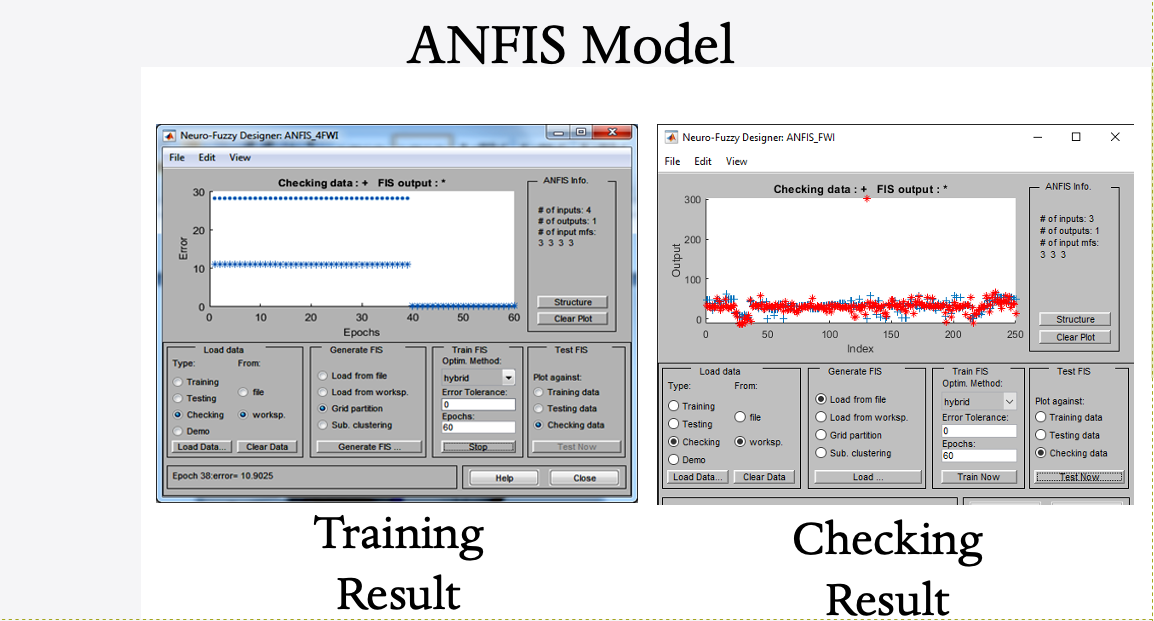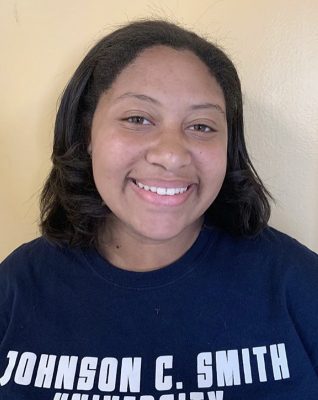
As part of their final presentation, Haya Dahhan’s team demonstrated how they used multiple modeling tools to provide quick and efficient predictions of forest fire outbreaks. Images via Haya Dahhan.
By Kouri Evans, Mahaley Holit, Haya Dahhan and Hannah Anderson
Johnson C. Smith University, as part of a CRC project led by Dr. Ahmed Faik, holds multiple annual summer camps focused on applying STEM knowledge to disaster-related research. Students from this year’s camps – which were held online – reflected on their experiences.
Our reason for joining the program was to gain experience in research. We as partners have agreed that this opportunity will help us prepare for our Senior Project course, and being able to work in a group and get insights and ideas from others was very helpful. Group collaboration allows for a chance to work through all ideas and work through the most effective ones. Our project involved researching the natural disaster of our choice and gathering data. We specifically wanted to look at different types of earthquake data: death tolls, cost of damages, which regions were most impacted.
Being able to bring all of the collected data together to look at earthquake impacts over the years added to the experience. The biggest takeaway would be learning how to find useful data and apply it to our research for visualization using Tableau software.
Using data mining tools for analysis helped us learn a lot of key things that build on the success of gathering good data. We learned that it takes time and a lot of patience to find good, reliable data. With more time for data mining research, we could have gotten better data and results. We might have also been able to see more patterns within the data and use more models than just clustering and correlation. It was just a little harder to do this remotely because we were only able to communicate with each other by email and phone, and sometimes via Zoom.
Overall, the program provided great information and we learned a ton on data mining. It was great working with everyone in the group, and Dr. Amin was a great help through the whole process We are very grateful to have been invited and involved into the program. If we get the chance to participate in the program again, we would gladly do it. We would highly recommend this program to anyone looking to gain hands-on experience in research.
Kouri Evans, a sophomore, and Mahaley Holit, a junior, both major in Computer Science Information Systems.
————————————————

Haya Dahhan
Research helps you to learn something new, strengthens your problem-solving skills and challenges you, while providing the opportunity to work with a faculty mentor and to connect with other faculty members and student researchers. I gained hands-on experience with research by creating a creative project, gained academic credentials that will help me create a well-rounded resume, and published our work as a a research team. We sharpened our leadership and teamwork skills by collaborating with others, and earned a stipend.
Unfortunately because of the COVID-19 pandemic, we had to do this research online. However, we were able to manage it by creating a group chat, and discussed all of our issues or problems to make everything work for all of us to finish the project successfully.
Our research was focused on designing and implementing two projects to estimate and predict forest fires. We did this using various weather parameters such as temperature, humidity, wind speed and rainfall in real time with Adaptive Neuro Fuzzy Inference System (ANFIS). We used a Neutral Network with Deep Learning (NNDL) technology by using MATLAB in order to model possible damages from the fires, because the rapid detection of fire and its proper control can save lives and property damages that worth millions. It is very critical to predict and evaluate the possibility of forest fires as accurately as possible nationwide to effectively avoid possible damages and disasters.
These two projects helped me with getting familiar with detection systems and components for forest fires, including three codes and three indexes: The Fine Fuel Moisture Code (FFMC), The Duff Moisture Code, The Drought Code (DC), The Initial Spread Index (ISI), BUI and Forest Fires Weather Index(FWI), in addition to related calculations and databases. I also learned the Fuzzy inference system, ANFIS and Deep Learning techniques, as well as how to apply the MATLAB Fuzzy toolbox and Deep Learning toolbox to develop the optimal models to estimate some important predicting factors for forest fires.
From this project, an ANFIS and a NNDL model can be built to predict dangerous degrees of forest fires, and provide quick and efficient assistance to correctly and accurately predict and estimate the occurring possibility of general forest fires based on two components, FFMC and FWI, in real time. By using these dynamic models, the forest fires dangerous degree (FWI) can be quickly and easily derived based on environment factors immediately without a complicated and time-consuming calculating process.
Haya Dahhan is a junior majoring in Computer Engineering.
—————————————————–

Hannah Anderson
I decided to participate in the DHS Four-Week research camp as a recommendation from my professor, Dr. Chakraborty. I had learned about the research camps during my second semester at Johnson C. Smith University. I completed my first research project at the beginning of May and shortly after started and completed the One-Week Summer DHS Research Camp. After doing those two projects, I wanted to do more and continue doing research. This is the third research project supported by CRC in my first year at Johnson C. Smith University. I thought it would be beneficial to work on another research paper and to be able to gain better insight on how to write a well-rounded research paper.
The group collaboration was extremely meaningful during this research camp because with only three of us in a group, the work had to be evenly distributed and stretched out so nobody was over or underworked. Having meetings on Zoom and collaborating on Google Docs was useful because my team and I got to work together in real time and were able to complete work together and communicate clearly. We had a clear schedule and were able to work together a few days out of the week to ensure we were up to speed on our research. I enjoyed working with a small group because it was not difficult to get everyone together like how it is with a larger group, especially because of the time zone differences. It was valuable to see my teammates’ ideas and seeing them come together to create our topic and project. Both of my teammates worked in the One-Week DHS Research Camp, so everyone had a similar experience and knew how to write a lengthy research paper.
During this camp, I worked on a project analyzing the economic effects of hurricanes. In this project, my team and I researched different hurricanes, specifically categories 4 and 5, and how they impacted different communities. Since this was a continuation of my last research project, my team and I already had a good amount of data we could add to during this camp. We compared the hurricane categories to their damage estimates and looked for trends and comparisons. We also looked at the death toll, barometric pressure and the recorded animals displaced and killed in these hurricanes. This project was interesting for me to continue because I had more freedom to answer the questions I wanted to ask from the first project.
From this project, I learned more about the economy. I learned about the effects natural disasters have on communities worldwide and how easily the economy can be damaged within only a few days. Billions of dollars’ worth of damages can happen in only a few hours because of such high speed winds and changes in barometric pressure.
Doing a project like this for the third time is beneficial and will help me in the future because of the experience that I will have in a field like this. Being able to say that I have worked on three research papers during my freshman year of college is an achievement that will make me stand out when applying for internships and jobs. This will also help me become a better researcher in the future as well. I will be able to confidently know how to research and create data visualizations for upcoming jobs and projects that I might have. As a result of this project, I ultimately learned how to work in a small group and put together a lengthy paper in a short amount of time. This was a rewarding experience and I am thankful I got to be a part of it.
Hannah Anderson is a sophomore majoring in Computer Science Information Systems.